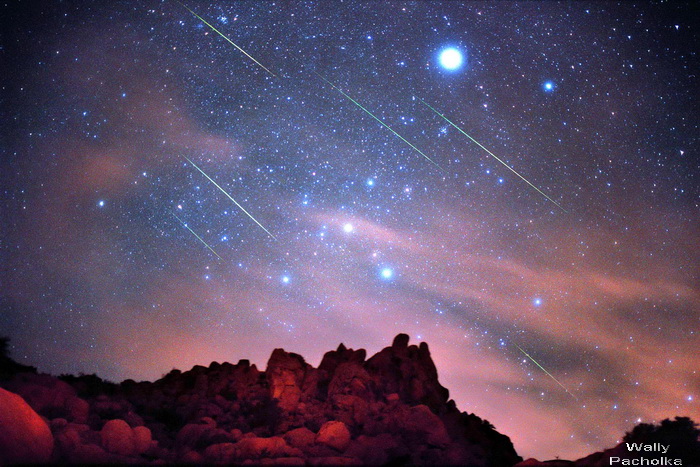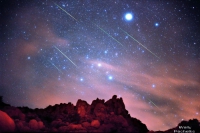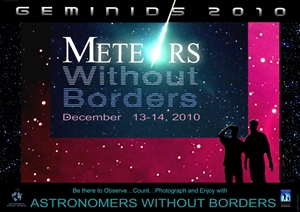Witnessing a shower of meteors can be a thrilling experience. These streaks of light across the sky - sometimes called “falling stars” - are caused not by stars falling but by bits of interplanetary dust, usually left behind by passing comets, which are captured by Earth’s gravity, fall into the atmosphere, and quickly burn up. Although some meteors fall every night, there are several times in the year when meteor showers occur (when the Earth passes through regions in space where dust is more dense). Many people are aware of the Perseid shower around Aug. 12, named because the meteors come from the direction of the constellation Perseus, but couple of other major showers are well worth watching too: the Quadrantids on Jan. 3; the Lyrids April 22; the Eta Aquarids May 4; the Delta Aquarids in Late July; the Orionids Oct. 20; the Taurids in early Nov.; and the Geminids Dec. 14.
Meteors without Borders (MwB) is a new AWB project designed to bring together amateur astronomy clubs and others who are already observing meteor showers, and also to get more groups involved. In addition, MwB will provide an avenue for liaison with meteor interest groups.
MwB will also encourage people to submit their visual meteor data. The meteor-viewing experience may be not only scientific but also creative and emotional—and it can take many forms. For example, Deirdre Kelleghan, AWB National Coordinator for Ireland, shared her Perseid meteor viewing in August 2010 by sketching the Perseids she saw over several nights in a composite drawing (see her sketch in the
AWB Astropoetry Blog ). And Romanian astropoet Andrei Dorian Gheorghe expressed his meteor experience through poetry:
“Sound was concerned / by the fall of a sad meteor / which left / a strange reverberation.” In whatever way you experience it, your encounter with meteors deserves to be shared—and MwB will help make this sharing possible.
 Leonid Meteor Storm by Wally PacholkaWitnessing a shower of meteors can be a thrilling experience. These streaks of light across the sky - sometimes called “falling stars” - are caused not by stars falling but by bits of interplanetary dust, usually left behind by passing comets, which are captured by Earth’s gravity, fall into the atmosphere, and quickly burn up. Although some meteors fall every night, there are several times in the year when meteor showers occur (when the Earth passes through regions in space where dust is more dense). Many people are aware of the Perseid shower around Aug. 12, named because the meteors come from the direction of the constellation Perseus, but couple of other major showers are well worth watching too: the Quadrantids on Jan. 3; the Lyrids April 22; the Eta Aquarids May 4; the Delta Aquarids in Late July; the Orionids Oct. 20; the Taurids in early Nov.; and the Geminids Dec. 14.
Leonid Meteor Storm by Wally PacholkaWitnessing a shower of meteors can be a thrilling experience. These streaks of light across the sky - sometimes called “falling stars” - are caused not by stars falling but by bits of interplanetary dust, usually left behind by passing comets, which are captured by Earth’s gravity, fall into the atmosphere, and quickly burn up. Although some meteors fall every night, there are several times in the year when meteor showers occur (when the Earth passes through regions in space where dust is more dense). Many people are aware of the Perseid shower around Aug. 12, named because the meteors come from the direction of the constellation Perseus, but couple of other major showers are well worth watching too: the Quadrantids on Jan. 3; the Lyrids April 22; the Eta Aquarids May 4; the Delta Aquarids in Late July; the Orionids Oct. 20; the Taurids in early Nov.; and the Geminids Dec. 14.






